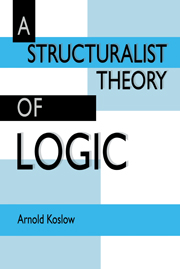Book contents
- Frontmatter
- Contents
- Preface
- Part I Background
- Part II Implication relations
- Part III The logical operators
- 11 Hypotheticals
- 12 Negations
- 13 Conjunctions
- 14 The disjunction operator
- 15 The logical operators parameterized
- 16 Further features of the operators
- 17 The dual of negation: Classical and nonclassical implication structures
- 18 The distinctness and relative power of the logical operators
- 19 Extensionality
- 20 Quantification
- 21 Identity
- 22 Special structures I: Logical operators on individuals: Mereology reconstituted
- 23 Special structures II: Interrogatives and implication relations
- 24 Completeness
- Part IV The modal operators
- Appendix A An implication relation for the integers in the programming language BASIC
- Appendix B Symmetric sequents as products of implication relations and their duals
- Appendix C Component-style logical operators and relevance
- Notes
- Bibliography
- Index
18 - The distinctness and relative power of the logical operators
Published online by Cambridge University Press: 05 May 2010
- Frontmatter
- Contents
- Preface
- Part I Background
- Part II Implication relations
- Part III The logical operators
- 11 Hypotheticals
- 12 Negations
- 13 Conjunctions
- 14 The disjunction operator
- 15 The logical operators parameterized
- 16 Further features of the operators
- 17 The dual of negation: Classical and nonclassical implication structures
- 18 The distinctness and relative power of the logical operators
- 19 Extensionality
- 20 Quantification
- 21 Identity
- 22 Special structures I: Logical operators on individuals: Mereology reconstituted
- 23 Special structures II: Interrogatives and implication relations
- 24 Completeness
- Part IV The modal operators
- Appendix A An implication relation for the integers in the programming language BASIC
- Appendix B Symmetric sequents as products of implication relations and their duals
- Appendix C Component-style logical operators and relevance
- Notes
- Bibliography
- Index
Summary
The distinctness of the logical operators
In studying the formal languages of the classical or intuitionistic calculus, there is a concern that the notation ensure that there be “unique readability.” If a sequence of expressions of the system is to count as a sentence of the system, then it should not happen that it counts as two sentences. Thus, where “∨” is the sign for the disjunction connective, a sequence such as “A ∨ B ∨ C” is not counted as a sentence, because it could be thought of as “(A ∨ B) ∨ C” or as “A ∨ (B ∨ C),” and these sequences are intended to count as distinct sentences, no matter how closely related they are logically. One way of expressing the concern is to think of various operators associated with sentence-building. For example, let E∨ and E→ be the operators that assign to the sentences A and B the sentences “(A ∨ B)” and “(A → B),” respectively. Then the condition for unique readability can be expressed by the requirement that each of these E's be one-to-one functions and that no two of them have the same range. Thus, in particular, if E∨(A, B) = E∨(C, D) for any sentences A, B, C, and D, then A = C, and B = D. And E∨(A, B) ≠ E→(C, D) for any A, B, C, and D.
In this study, logical operators such as conjunction C and disjunction D do not yield unique readability results.
Information
- Type
- Chapter
- Information
- A Structuralist Theory of Logic , pp. 151 - 157Publisher: Cambridge University PressPrint publication year: 1992
